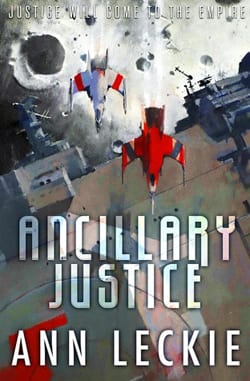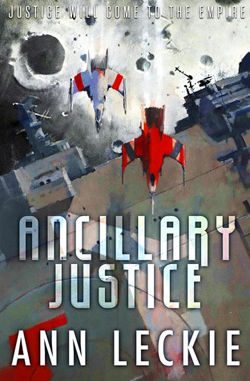Written by Laird Allen
 “Ancillary Justice” by Ann Leckie
“Ancillary Justice” by Ann Leckie
Orbit, 2013. 416 pages.
Available in hardback, paperback, kindle, audible.
This review contains minimal spoilers.
“Ancillary Justice,” by Ann Leckie, is a science fiction epic spanning thousands of years and dozens of planetary systems, encompassing themesfrom social inequity to a deeply personal quest for revenge from something that stretches the definition of a person. While the book is clever and interesting, the protagonist’s icy detachment spreads to all aspects of the storytelling and sometimes dulls the adventurous tone.
It’s difficult to discuss “Ancillary Justice” at length without spoilers. The protagonist, Breq, was once an ancillary, a sort of corpse-soldier: a human body commandeered by the Radch empire, its original personality killed and the body repurposed as a walking, talking fighting machine remotely controlled by an artificial intelligence. These ancillaries are the primary fighting unit of the Radch, a savagely expansionist military dominion conquering the many human-settled planets through a series of violent “Annexations.” Breq was once part of the troop carrier, “Justice of Toren,” but has been brought low and now seeks revenge for her killing and for the things she was forced to do as a soldier.
The story itself is told in flashbacks. The main storyline, Breq is searching for relics of an ancient genocide in hopes of finding a way to circumvent the protections of the Radchaai surveillance state. The flashback story takes us back to a planetary annexation and a backwater city where “Justice of Toren” is serving as ancillary troops, and her human lieutenant is trying to earn the trust of the locals in the aftermath of a violent invasion despite deep and abiding ethnic strife in the local population. Both stories center around Anaander Mianaai, the Lord of the Radch, one person copied thousands of times into thousands of bodies who has turned the Radch into an expansionist empire. Now, thousands of years and millions of bodies later, he still rules supreme over it to the extent of implanting commands only they can access that give them ultimate control over all the ships and AIs of the empire. Breq’s quest for revenge centers on Mianaai, and through the lens of her obsessive hatred we come to learn more about the world they inhabit. She is a grim observer in a brutal universe wherein powerful families and corrupt officials dominate a system of perverted testing apparati and nepotistic arrangements couched in corporate lingo. It’s a fascinating, if somewhat bleak, world.
And indeed, as the protagonist is something of a cold fish, the world is the most interesting character in “Ancillary Justice.” It is indeed one of the best science fiction takes I’ve read yet on military expansion viewed through the lens of the United States’ overseas adventurism. Science fiction as a genre is roundly and rightly criticized for glorifying military violence and covering up its bloodthirsty attitude by having “inherently evil aliens” serve as pre-otherized “Others” for the science fiction hero to mow down in chitinous waves. Leckie has navigated this issue with grace and pointed out the inherent horror of expansionist war. The use of Ancillaries, troops forcibly harvested from the local population, is a very clever narrative device for temporally inverting the atrocity and the occupation. The whole has a sort of breathless, ripped-from-the-headlines relevance that is rare in the world of science fiction.
There are many other interesting narrative and cultural flourishes. The Radch are techno-barbarian types who are intensely religious and superstitious, much addicted to tea, and almost helpless without their servants and cybernetic implants. Sulky, arrogant, and violent by turns, they read somewhere between the British Imperial Raja and the Klingons. Their language is key as well: Raadchaai have a default-female assumption, and Breq, as a former AI terminal, is singularly bad at guessing people’s genders and often panics when afraid of misgendering people. There are passages describing ritual oracles and preferred flowers for offerings that do an excellent job of putting the reader in the world.
The biggest flaw, however, is parallel to that: the stark unpleasantness of much of the world. Corruption and bellicosity are the order of the day, and despite having personality duplication, mind-body teleoperation, armor and communication gear that defies easy description, there seems to be no science, research, or advancement. A thousand years pass in the book without a single meaningful cultural or technological change; and there’s a logic behind it, with the omnipresent Mianaai locking society into certain patterns, but it’s frustrating. The universe of “Ancillary Justice” is frozen in amber, except for a few points of deus ex machina that stir the events of the story to life, and this is the point that gives lie to the many comparisons that put Leckie as the new Iain M. Banks. This debut novel shows incredible promise, and as the first part of a trilogy, I look forward to seeing more.
As to other formats, the audiobook version of “Ancillary Justice” is narrated by Celeste Ciulla and is very competently done. Ciulla voices all the characters with grace and flexibility and puts a tune to all of the songs in the book, actually singing them in character voice. The biggest problem with the audiobook version is not the profusion of neologisms, which Ciulla handles with aplomb, but rather the somewhat bland and unfeeling Breq, who is a difficult protagonist to get a handle on. Ciulla’s take on the character is good but can bog down in places of particularly dense prose. Audiobook fans will find much to praise here in detail, but the work as a whole, at 13 hours and 47 minutes, has dull stretches.
The book is “Ancillary Justice” by Ann Leckie. It’s available on Amazon from $9.21 and as an audiobook from Audible at $38.95.




